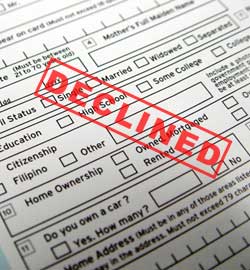 Did that headline grab your attention? It seems to be grabbing attention across the country, but when homeowners apply for these rates to refinance their mortgages, they are being declined. What is going on? According to Jack M. Guttentag, The Mortgage Professor on Yahoo, millions of mortgages currently with rates of 6-9% or higher are being declined because of Fannie Mae and Freddie Mac, now in government conservatorships. They were too liberal in their lending for years and are now reacted to the aftermath by becoming excessively restrictive. As per Guttentag, these are the reasons consumers aren’t getting approved:
Did that headline grab your attention? It seems to be grabbing attention across the country, but when homeowners apply for these rates to refinance their mortgages, they are being declined. What is going on? According to Jack M. Guttentag, The Mortgage Professor on Yahoo, millions of mortgages currently with rates of 6-9% or higher are being declined because of Fannie Mae and Freddie Mac, now in government conservatorships. They were too liberal in their lending for years and are now reacted to the aftermath by becoming excessively restrictive. As per Guttentag, these are the reasons consumers aren’t getting approved:
1. Credit Score Too Low
Many consumers are being declined because their credit scores are too low. Most have the same score, or even higher than when they were approved for their first loan, but now these scores are not high enough to pass Fannie and Freddie’s new underwriting standards. Guttentag states:
“Their underwriting and pricing structures are designed to maximize their net earnings, as if they were still private firms. Fannie and Freddie are now part of the government and should set their underwriting rules and pricing adjustments not to maximize net revenue but to break even over a long time horizon.”
2. LTV Maximum Requirements
Other consumers have a sufficient credit score but are being declined because of Loan-to-Value (LTV) maximum requirements when applying for the Home Affordable Refinance Program (HARP). The program was designed to make refinancing a possibility for current borrowers who owe more on their homes then they are even worth. Guttentag states:
“A maximum LTV in the HARP programs cuts out a sizeable segment of the potential market, for no good reason. The agencies are already on the hook for any losses on high LTV loans, and a rate reduction can only reduce the probability that a default will occur that would trigger the loss.”
3. Mortgage Insurance
Under HARP rules, if there is no Mortgage Insurance (MI) on the existing loan, then none will be required on the new one. If there is MI on the old loan, it will carry forward on the new loan, providing the PMI firm agrees. However, if the current LTV exeeds 105%, they won’t agree unless the new loan is being underwritten by the existing servicer. Guttentag says:
“Fannie and Freddie ought to inform potential HARP borrowers who have mortgage insurance and LTVs greater than 105% that they can only refinance with their current lender, and they should examine whether there is anything they can do to remove the PMI roadblock.”
4. Not Knowing Where to Look
When a lender tells a consumer that they aren’t eligible for the HARP program, there shouldn’t give up hope. Some lenders may have higher maximum LTV’s then others, you just have to know where to look. From Guttentag:
“Fannie and Freddie ought to do a better job of informing potential borrowers how to find a lender who will make 125% HARP loans, and they should review their policies that have discouraged broader lender participation.”
5. Just Out of Luck
When consumers have loans that are not owned by Fannie or Freddie, the only possibility to refinance is the new FHA program, but it requires the existing lender to write down the balance to 97.75 of house value. When a borrower is making on time payments, a lender will have very little incentive to do so.
Are you currently paying your mortgage on time but behind on credit card payments? You may qualify for the HARP program or even a loan modification. Contact me today contact to go over your options. I offer a free consultation to all new clients.
 What Makes Me Different From the Others?
What Makes Me Different From the Others?